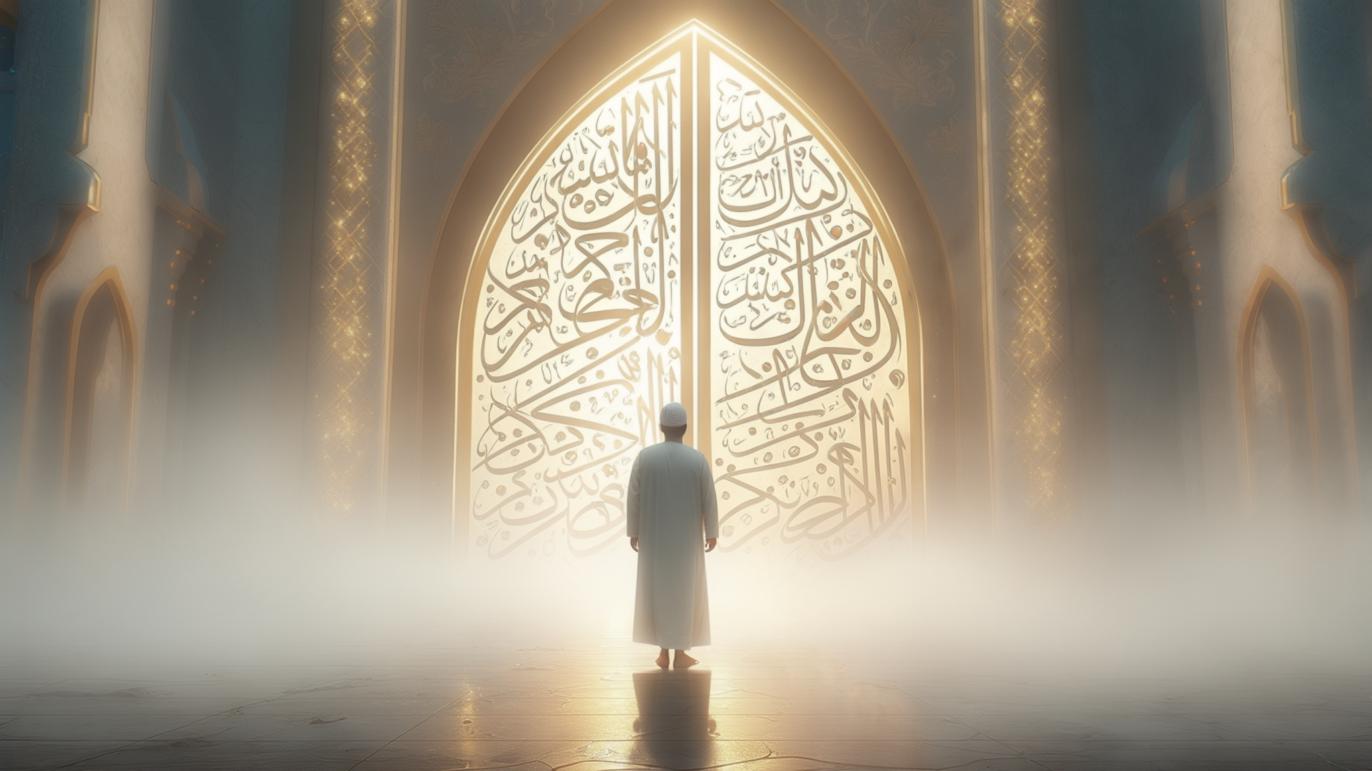THE SECOND PRINCIPLE
Knowledge of the Deen of Islaam with the proofs. It is to submit to Allaah with Tawheed, and so yield obediently to Him, and to free and disassociate oneself from shirk and its people. And it is of three levels: Islaam – submission and obedience to Allaah, Eemaan – true belief comprising belief of the heart, speech of the tongue and action of the limbs, and ihsaan – perfection of worship. Each level has its pillars.
[The first level] The pillars of Islaam are five:
- The testification that none has the right to be worshipped except Allaah, and that Muhammad is the Messenger of Allaah
- To establish the Prayer
- To pay the zakaat
- To fast Ramadhaan
- To make hajj to the sacred House of Allaah
. Its meaning is that none has the right to be worshipped except Allaah: "Laa Ilallaah" except Allaah, affirms worship for Allaah alone, and that there is to be no one given any share of His Dominion and Sovereignty.شَهِدَ اللَّهُ أَنَّهُ لَا إِلَٰهَ إِلَّا هُوَ وَالْمَلَائِكَةُ وَأُولُو الْعِلْمِ قَائِمًا بِالْقِسْطِ ۚ لَا إِلَٰهَ إِلَّا هُوَ الْعَزِيزُ الْحَكِيمُAllaah bears a witness that none has the right to be worshipped but Him; and likewise the angels and the people of knowledge bear witness: He who maintains justice, none has the right to be worshipped but Him, the All Mighty, the All Wise.Soorat Aal 'Imraan: 18
. And His Saying "Say: "O people of the Scripture (Jews and Christians): Come to a word that is just between us and you, that we worship none but Allaah, and that we associate no partners with Him, and that none of us shall take others as lords besides Allaah. Then, if they turn away, say: "Bear witness that we are Muslims." [Soorat Aal 'Imraan: 64].وَإِذْ قَالَ إِبْرَاهِيمُ لِأَبِيهِ وَقَوْمِهِ إِنَّنِي بَرَاءٌ مِّمَّا تَعْبُدُونَ * إِلَّا الَّذِي فَطَرَنِي فَإِنَّهُ سَيَهْدِينِ * وَجَعَلَهَا كَلِمَةً بَاقِيَةً فِي عَقِبِهِ لَعَلَّهُمْ يَرْجِعُونَAnd (remember) when Ibraheem said to his father and his people: "Verily, I am innocent of what you worship, Except Him (I worship none but Allaah Alone) Who did create me, and verily, He will guide me." And he made it a Word lasting among his offspring, that they may turn back (to repent to Allaah or receive admonition).Soorat az Zukhruf: 26-28
The proof for the testification that Muhammad is the Messenger of Allaah, is the Saying of Allaah: “There has indeed come to you Allaah’s Messenger, from amongst yourselves and known to you. It grieves him that you should suffer. He is eager and anxious for the guidance of those of you who are astray, and that they should repent and return to the truth, and he is full of compassion and mercy for the Believers” [Soorat at Tawbah: 128]. The meaning of the testification that Muhammad is the Messenger of Allaah is: to obey him in whatever he commands; to believe and testify to the truth of everything he informs of; to avoid whatever he forbade and prohibit; and that you worship Allaah only with that which he prescribed.
The evidence for the Prayer (as salaam) and the zakaat, and the explanation of Tawheed is the Saying of Allaah: “And they were not commanded except that they should worship Allaah alone, making their worship and obedience purely for Him, upon the true Deen and free from shirk; and that they should establish the prayer and pay the zakaat, and that is the straight and true Deen” [Soorat al Bayyinah: 5]
The evidence for Fasting (siyaam) is the Saying of Allaah: “O you who believe Fasting is prescribed as an obligation for you as it was prescribed as an obligation for those who came before you, so that you may attain taqwaa, obedience to Allaah and avoidance of whatever He has forbidden.” [Soorat al Baqarah: 183].
The evidence for hajj is the Saying of Allaah: “And hajj to Allaah’s sacred House is an obligation upon those able to perform it; and whoever refuses and rejects the obligation of hajj to Allaah’s House, then Allaah has no need of him or of any of the creation” [Soorat Aal ‘Imraan: 97].
[The second level] Eemaan
And it has seventy and odd branches, the highest of them is the saying that ‘none has the right to be worshipped except Allaah’ (laa ilaaha Ilallaah), the lowest of them is ‘removal of that which is harmful from the path, and a sense of shame (al hayaa) is a branch of Eemaan.’ Its pillars are six: to truly believe in Allaah; His angels; His Books; His Messengers; The Last Day; and that you truly believe in pre-decree (al qadr) its good and its evil. The proof for these six pillars is the Saying of Allaah: “It is not righteousness that you turn your faces to the east or the west, but rather righteousness is the righteousness of those who truly believe in Allaah, and the Last Day, and the Angels and the Books and the Prophets.” [Soorat al Baqarah: 177]
The proof for pre-decree is the Saying of Allaah: “We have created all things in accordance with a pre-decreed measure.” [Soorat al Qamar: 49]
The third level is ihsaan
Of which the first pillar is “to worship Allaah as if you see Him and if you do not see him, then He sees you”
And the proof is His saying: “Truly, Allaah is with those who fear Him and those who are Muhsinoon (good-doers).” (16:128)
And His saying: “And put your trust in the All-Mighty, the Most Merciful, who sees you when you stand up and your movements among those who fall prostrate. Verily! He, only He, is the All-Hearer, the All-Knower.” (26:217-220)
And His saying: “Whatever you may be doing, and whatever portion you may be reciting from the Qur’aan, - and whatever deed you, We are Witness thereof, when you are doing it.” (10:61)











